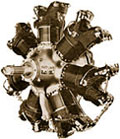

|

|

| |
M O T O R
|
E N G I N E
|
O T H E R
|
The Thing in Front That Makes the Fan Go
Call it what you want, it gets an airplane off the ground and it doesn't care what you claim it is.

The Wright brothers designed their motor, patented their motor, and advertised their motor. Follow-on Glenn Curtiss started his Curtiss Aeroplane & Motor Co. Ask any pioneer aviator or QBer what those old noisemakers were commonly called and he will most likely say, "motors."

Admittedly there was a sprinkling of engines powering some aeroplanes, even a few powerplants, but the majority had motors. A 1911 Aeronautics featured ads by Roberts Motor Co, Adams-Farwell Revolving Motors, Kirkham Motor Co, ditto for Frontier, Roland, Wolverine, and others. Emerson Engine Co and Hall-Scott Power Plants were kicktraces. Western Flying in 1930 still had ads for Kinner Airplane & Motor Co, Menasco Motors, Mattley Aircraft Motors, and that Curtiss bunch.

Electrical engineers were likely the first to make sparks about the word "motor" being reserved for those producing power via electricity, whereas engines were strictly internal combustion things. Motors hummed while engines barked and shouted and threw pistons. But they flat-out ignored the fact that engines were initially powered by steam. So where to fit railroad engines, not to mention hybrid automobiles with both gas and electric power? And what about Aerofiles' search engine, which is in fact an electricity-based search motor? Coincidentally, our first national magazine for car enthusiasts was titled, simply, Motor.

Hence, fancifully, as enginists driving our GEC (formerly GMC) pickup or Winnebago enginehome along the engineways of America, or wheeling our Harley enginecycle down to the lake, where we hop aboard an outboard engineboat, we can reflect on how those powerplants were ostensibly the doings of mechanical motorneers. Then go back to our room at the Engtel-6 and sleep it off.

Bottom line: It's like getting some folks to pronounce forte as "fort" (a French word, wherein a trailing "e" is silent unless it has a stress-mark) when they refer to a strong point, instead of "for-tay" (an Italian word, where they pronounce everything they can), which is a musical term meaning loud. It's a useless battle with hollow victories, if any, and the bottom line always remains, "You're saying it wrong, but I know what you mean."

While we at Aerofiles are fence-sitters, we favor engines as a general rule (pardon us, Mr Edison) but do use an occasional motor for the old aircraft/planes/ships, if only because the word seems to somehow fit better with Aeromarines, JN-4s, and Benoists ... or Ben-waaas, if you prefer. (— K O Eckland, an enginemouth)
|